It’s Day 29 of our October horror movie countdown with The Kasturi/Files here at Speculative Chic! Halloween is almost upon us, and then the lonesome October will be done, alas! Here’s more film analysis (argument?), book recommendations, and some drinkies from Sandra Kasturi and Gemma Files.
 Gemma: Amongst the original slate of Universal monster movies — pre-Code films spearheaded by Carl Laemmle Jr., whose ambition gave us indelible cinematic visions of Dracula and Frankenstein, as well as lesser creeps like the Invisible Man, the Wolf Man, and the Creature from the Black Lagoon — Karl Freund’s 1932 version of The Mummy is often one which gets overlooked, particularly when you factor in the later box office success of the property’s 1999 reboot (written and directed by Stephen Sommers, starring Brendan Fraser and Rachel Weisz). Taken side by side, it becomes obvious that The Mummy 1932 was always intended to be an actual horror film, though one which seems restrained and quaint by today’s standards, while The Mummy 1999 is a swashbuckling tale of high adventure with horror trappings, so pulpy it virtually squishes between the audience’s teeth. Yet they share one very interesting strand of storytelling DNA: both films organize themselves around a literally undying love story mirrored by a contemporary romance.
Gemma: Amongst the original slate of Universal monster movies — pre-Code films spearheaded by Carl Laemmle Jr., whose ambition gave us indelible cinematic visions of Dracula and Frankenstein, as well as lesser creeps like the Invisible Man, the Wolf Man, and the Creature from the Black Lagoon — Karl Freund’s 1932 version of The Mummy is often one which gets overlooked, particularly when you factor in the later box office success of the property’s 1999 reboot (written and directed by Stephen Sommers, starring Brendan Fraser and Rachel Weisz). Taken side by side, it becomes obvious that The Mummy 1932 was always intended to be an actual horror film, though one which seems restrained and quaint by today’s standards, while The Mummy 1999 is a swashbuckling tale of high adventure with horror trappings, so pulpy it virtually squishes between the audience’s teeth. Yet they share one very interesting strand of storytelling DNA: both films organize themselves around a literally undying love story mirrored by a contemporary romance.
Sandra: I’ll say right off that bat that I adored the 1999 Mummy reboot: I find Brendan Fraser one of those underrated actors who really should have had a major A-list career, but seems to get steady work nevertheless; I keep hoping he gets something interesting to do, because he’s an actor who really commits to what he’s doing. And Rachel Weisz is always wonderful; throw in character actors like John Hannah and Kevin J. O’Connor, plus the divinely dishy Oded Fehr — whom I’d watch in just about anything — and you’ve got the great basis for a story. Plus: Arnold Vosloo! Darkman #2 himself, now playing Imhotep. It doesn’t get any better. And I’ve loved Stephen Sommers since his goofy and fun underwater monster movie, Deep Rising, which is better than it really needs to be. I watched The Mummy in the theater with an absolutely huge grin on my face and loved every over-the-top minute of it.
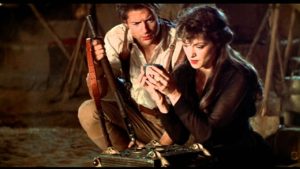
Gemma: Yeah, I actually had to review The Mummy 1999, and I think I was the only person who did like it at the screening I attended (aside from my husband, Steve). In a lot of ways, it really prefigured Pirates of the Caribbean: The Curse of the Black Pearl (2003) and the whole series that came afterwards — it takes the basic template of a pulp adventure from the 1920s, then pares out a lot (though not all) of the racism, adds at least one female character who shares protagonist status and drives the narrative forward with her own actions, then plays it all back at eleven plus. With Pirates of the Caribbean, the jumping-off point seemed to be 1940s Michael Korda/Errol Flynn pirate movies like my absolute genre fave, Captain Blood; with The Mummy 1999, half of it’s The Mummy 1932, while the other half is 50% pure Robert E. Howard, 50% a bodice-ripper about why librarians are not boring, thank you very much! With a strange undercurrent of mournful post-WWI angst, as embodied by Winston the former flying ace who’s been drinking himself to death since failing to die in battle, and — oddly enough — Weisz’s character’s brother Jonathan (Hannah), the semi-scoundrel who gets most of the film’s best lines, who also seems like he mainly steals, drinks, and lies because he knows nothing will ever quite live up to his days at the Front. It’s like a streak of Peaky Blinders PTSD grit running straight through the middle of a cotton candy souffle.
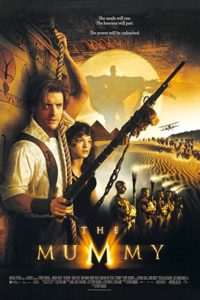 Sandra: Ah, Errol Flynn! Really, no one has buckled swash in quite the same way since he did. Sigh. I saw the The Mummy 1932 for the first time, believe it or not, a couple of nights ago. I really felt that my cinematic background (such as it is) was lacking because of not watching some of these classic older films that form part of our cultural conversation, not just about horror movies, but movies in general. And yes, it’s very much of its time. Let’s just get this out of the way: there are a lot of horrifying things in the movie (of the not-supernatural variety): the lack of women having any kind of agency and just being forced to do what they’re told, practically no Egyptian or even Middle Eastern actors of any sort (instead, subbing in white guys in blackface and brownface, oh yes!), and of course every kind of British colonialism you can think of. Which I don’t mind as much as the other stuff for the simple fact that, yeah, the British were still stomping all over Africa and other parts of the world with their imperialist nature, so there’s some (unpleasant) verisimilitude in that, though of course the Brits didn’t know all that shit was going to come to an abrupt end (at least in obvious ways) with the rise of the much more awful German imperialist machine. But that is a whole discussion that deserves its own time and space; right now we just want to say that, yeah, we know all that awful stuff is in there, but there are still things to be learned from this movie, and I for one have never felt that erasing evidence of past mistakes gets anyone anywhere. Let’s look at it with clear eyes and acknowledge it happened. But for the time being, we’re looking at this film just as a (sort of) monster movie.
Sandra: Ah, Errol Flynn! Really, no one has buckled swash in quite the same way since he did. Sigh. I saw the The Mummy 1932 for the first time, believe it or not, a couple of nights ago. I really felt that my cinematic background (such as it is) was lacking because of not watching some of these classic older films that form part of our cultural conversation, not just about horror movies, but movies in general. And yes, it’s very much of its time. Let’s just get this out of the way: there are a lot of horrifying things in the movie (of the not-supernatural variety): the lack of women having any kind of agency and just being forced to do what they’re told, practically no Egyptian or even Middle Eastern actors of any sort (instead, subbing in white guys in blackface and brownface, oh yes!), and of course every kind of British colonialism you can think of. Which I don’t mind as much as the other stuff for the simple fact that, yeah, the British were still stomping all over Africa and other parts of the world with their imperialist nature, so there’s some (unpleasant) verisimilitude in that, though of course the Brits didn’t know all that shit was going to come to an abrupt end (at least in obvious ways) with the rise of the much more awful German imperialist machine. But that is a whole discussion that deserves its own time and space; right now we just want to say that, yeah, we know all that awful stuff is in there, but there are still things to be learned from this movie, and I for one have never felt that erasing evidence of past mistakes gets anyone anywhere. Let’s look at it with clear eyes and acknowledge it happened. But for the time being, we’re looking at this film just as a (sort of) monster movie.
Gemma: True that, all of it. But looking for sociopolitical self-awareness in a Universal monster movie is like looking for wokeness in general at a GOP convention — it just ain’t gonna happen. Walk on, walk on, I am invisible, as Lawrence of Arabia would say.
Sandra: Very true! What I find fascinating about the original Mummy’s narrative is that almost a decade passes between the titular monster being dug up, and the action of the current narrative starting up. So . . . what was Imhotep (Boris Karloff) doing in the interim? I guess . . . working as an expert on antiquities and waiting around to manipulate other archeologists into digging up his beloved as soon as he could? It just took a decade? I guess? Does he need to eat? Well, I guess he’s thousands of years old and undead, so . . . nope? I often have a lot of practical questions about these things!
Gemma: This is genuinely not something I ever thought about, but goddamnit, you’re right! I like to think he was amassing a bunch of Egyptian magical items to aid him in his quest for Anck Su Namun’s tomb, and otherwise probably punishing tomb robbers and developing a network of people who’ll do whatever he wants when he points his ring at them and whispers: “Nebet, nebet . . .”
Sandra: Sure, that seems reasonable! I mean, it’s obviously a lot of working getting ready to raise the dead, so it’s best to prepare and get your ducks in a row. I did love that when the Mummy first comes to life, the sight of him sends young archaeologist Ralph Norton (Bramwell Fletcher) around the bend and he can’t stop laughing hysterically; you find out later that he died insane in an asylum. That’s something I find I don’t see that much in movies any more — the maniacal hysterical laughter that leads to a psychotic break and that’s the end of that story. Usually, you get to see them later when the current hero has to get information. So, even though it felt somewhat truncated, I found it weirdly engaging and even a bit eerie.
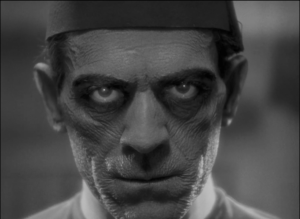
Gemma: “He . . . heeee . . . went for a little waaaaalllllk! Ha ha ha HA HAAAAAAA!!!!”
Sandra: Ha! And can I just say that Zita Johann, who plays Helen Grosvener/Anck Su Namun looks eerily like Drew Barrymore — enough so that I actually looked her up, thinking maybe she was Drew’s great-grandmother or something. But no!
Gemma: Zita Johann’s buggy eyes are really something else. I also love the fact that Helen, like Rachel Weisz after her, is specifically identified as being half-Egyptian, thus giving her a genetic stake in all the musty weirdness. Though I much prefer Rachel’s choice of armchair archaeologist/super-librarian for a career, as opposed to . . . whatever the fuck it is Helen does all day, aside from lounge around on really nice couches.
Sandra: As you know, I am a big fan of lounging about on really nice couches, preferably with a cocktail, but I think even I’d balk if that was literally all I had to do. Well, maybe that’s why an undead former love coming into the picture seems appealing: I mean, WTF else was Helen doing? She was probably bored out of her tree. Anyway. Imhotep/Ardath Bey (the name Imhotep assumes while waiting around for his honeybun to resurface, which Sommers later gave to Oded Fehr’s character in his own version as Ardeth Bey) is suitably creepy because, well, Boris Karloff has that face, that creepy melancholy face, so suited to horror films, as we all know, from his various turns as Frankenstein, etc. And he seems so urbane and reasonable that you kind of get where he’s coming from. Yeah, he and Anck were separated by death too soon . . . of course he wants her back! Who wouldn’t want their great love back from the dead if it could be accomplished? It’s only when he realizes that her soul resides in the present-day Helen and he decides he’s going to basically give her a magical roofie, murder her, then bring her back as his original dead beloved that you think, um, NO.
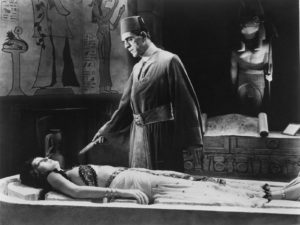
Gemma: Oh, so much to love about Original Ardath Bey. There’s the fact that he’s still so fragile and crumbly he can’t really do more than stand looming over Zita Johann and giving her long, smoldering, hypnotic looks; they’re afraid to touch each other, which is genuinely hot as hell. Then there’s that wonderful flashback sequence with him showing her the past in a scrying pool, which Sommers again stole for The Mummy Returns (2001) — the odd seductiveness of Karloff’s murmuring, slightly lisping voice, telling her: “I will show you visions of love . . . and sin . . . and death.” Similarly, once Johann’s been opened up to her Anck Su Namun persona, the objection she has to being mummified alive seems like both something totally practical and yet a tragic betrayal of the fact that Imhotep suffered exactly the same fate for her, apparently gladly! His will and the scroll are what kept him alive this long, so he could reunite with her, but she knows the gods never wanted that, so she appeals to them and that’s it, buddy. Cue up the incredible romantic main theme, stolen from Tchaikovsky’s Swan Lake, and poor Imhotep blows away, returned to dust.
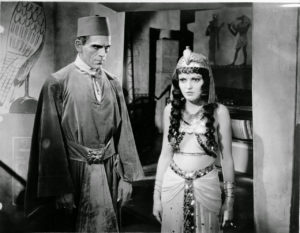 Sandra: I know! It’s kind of a tragic romance, isn’t it? And the movie actually starts with that Tchaikovsky bit, which everyone will recognize as the part of the Black Swan, which kind of indicates from the get-go that this shit is not going to work out. What were they going to do, two raised-from-the-dead past-Millennials? Move to an Egyptian suburb and raise a family? Nuh-uh. The Mummy isn’t a long movie, and it doesn’t have the sheer sense of fun and derring-do that the 1999 remake does, but the 1932 version still has something to say for its oeuvre; and after all, it was the first of its kind. And as you say, Gemma, there’s the undying love story — and who’s not a sucker for that?
Sandra: I know! It’s kind of a tragic romance, isn’t it? And the movie actually starts with that Tchaikovsky bit, which everyone will recognize as the part of the Black Swan, which kind of indicates from the get-go that this shit is not going to work out. What were they going to do, two raised-from-the-dead past-Millennials? Move to an Egyptian suburb and raise a family? Nuh-uh. The Mummy isn’t a long movie, and it doesn’t have the sheer sense of fun and derring-do that the 1999 remake does, but the 1932 version still has something to say for its oeuvre; and after all, it was the first of its kind. And as you say, Gemma, there’s the undying love story — and who’s not a sucker for that?
Gemma: I am a huge sucker for that. It is, as the kids say, one of my bulletproof kinks. Like people couldn’t tell. (Though most of my relationships are far less functional than either Rachel/Brendan OR Karloff/Johann.)
Sandra: I’m pretty sure my marriage isn’t suffering from an undying Mummy curse, but who knows? Brett (my husband) did used to say that he’d gladly die for me, to which I responded, “Well, that’s nice, but right now, maybe you could just take out the garbage?” Maybe I’m less romantic than I thought?
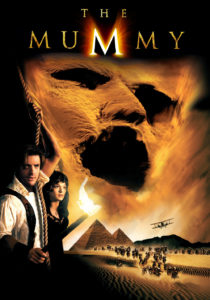 Anyway, just going back quickly to The Mummy remake, I think one of the things I adored so much about it is how gleefully fun it is. It doesn’t pretend to be anything it’s not, it just asks you to plonk your ass in your seat and let it take you for a roller coaster ride. I think the last time I felt that thrill in a movie theater was when I saw Raiders at the Lost Ark at age fourteen, and knew nothing about the movie in advance. I sat there with my mouth open and felt like a kid a generation before watching those Saturday movie serials with intrepid heroes and lost treasures! And The Mummy 1999 gave me, for a couple of hours, that feeling of being a kid again, when everything is absolutely thrilling beyond compare and you don’t notice plot holes, or lame effects, you just sit there with your mouth and eyes open, drinking in a sense of wonder. That movie isn’t perfect by any stretch of the imagination, but whooo-eeee! It sure is something for teen me!
Anyway, just going back quickly to The Mummy remake, I think one of the things I adored so much about it is how gleefully fun it is. It doesn’t pretend to be anything it’s not, it just asks you to plonk your ass in your seat and let it take you for a roller coaster ride. I think the last time I felt that thrill in a movie theater was when I saw Raiders at the Lost Ark at age fourteen, and knew nothing about the movie in advance. I sat there with my mouth open and felt like a kid a generation before watching those Saturday movie serials with intrepid heroes and lost treasures! And The Mummy 1999 gave me, for a couple of hours, that feeling of being a kid again, when everything is absolutely thrilling beyond compare and you don’t notice plot holes, or lame effects, you just sit there with your mouth and eyes open, drinking in a sense of wonder. That movie isn’t perfect by any stretch of the imagination, but whooo-eeee! It sure is something for teen me!
Gemma: I had a friend once who was old enough to have seen maybe not The Mummy 1932 but definitely The Mummy’s Hand (1940) in a movie theater, and he always used to put it this way: “People always laugh at the idea of the Mummy being scary, because back in the day, it moved so slow, just limping along behind people with bits of it falling off . . . but it always caught up, and you know why? Because it’s death. The Mummy is death. That’s why it’s scary.” So there you have it, folks: The Mummy, the It Follows of its time, and not even really minus the sexual component, or at least the love component. Sommers’s version moves faster and has a lot more tricks, but in the end, he’s still a dead man walking, driven by immortal desire . . . your worst nightmare as a stalker, for sure. And that’s pretty fucking creepy.
Cocktail: Mummies Galore
Sandra: I thought for sure there wouldn’t be such a thing, but thank Bast (or Google), there’s a Mummy cocktail! Yay!
 The Mummy
The Mummy
Ingredients:
- 2 oz vodka
- 1 oz orange liqueur (cointreau, grand marnier . . .)
- 1 tbsp lemon juice
- 1 tbsp club soda
Directions: Mix vodka, triple sec, and lemon juice in an old-fashioned glass half-filled with ice. Top off with club soda. Stir. I feel like 1 tbsp of club soda is low . . . I’d just top up with club soda.
Since we’re talking about two movies, I think you deserve a second cocktail!
Rummy Mummy
 Ingredients:
Ingredients:
- 1 ½ quarts half-and-half cream
- 2 3/4 cups Coconut-flavored rum
- 3/4 cup Hazelnut liqueur
- 3/4 cup Vanilla-flavored vodka
Directions: Mix all ingredients together in a tall pitcher. Stir gently. Pour into stem glasses over a couple of ice cubes (don’t add too much: you don’t want watery cream). This is a nice dessert drink! But quite boozy, so again: drink responsibly.
Book Recommendations
Gemma: Some of my favorite pulp was written by A. Merritt, who was heavily influenced in turn by H. Rider Haggard, and both of them were particularly partial to narratives in which strapping contemporary dudes got caught up in investigating ancient dead civilizations which turn out to be actually quite alive, if you just know where to look. So from Merritt I would suggest The Moon Pool, while from Haggard I would of course suggest She, probably his best-known work.
In both cases, the books combine love interests, antagonists are extremely long-lived, and beautiful women whose brains and wills are just as attractive as any other part of their bodies. Hell, She even has a male equivalent of Helen Grosvenor, i.e. a ridiculously good-looking dude who happens to perfectly resemble the reincarnation of the lost love of Ayesha, “She Who Must Be Obeyed.” Otherwise, I’ll also recommend The Devil’s Ark by Stephen Bywater, in which an archaeological dig outside of 1930s Mosul, Iraq turns out to unearth neither a tomb nor a temple, but the chamber where apocryphal vampire-goddess Lilith herself may have been interred alive, along with her equally ravenous daughters. It’s got The Mummy 1932’s tone and The Mummy 1999’s thrills, so check it out.
Pauline Gedge’s The Scroll of Saqqara is also a great mummy novel actually involving mummies! The main characters are an Egyptian prince who robs graves as a proto-archeologist, and thus incurs a curse from Thoth. The family whose tomb he violated are brought back to life just long enough to destroy his family. It’s the shit.
Sandra: Oooh! I love Pauline Gedge. I’d be remiss not to recommend Anne Rice’s The Mummy, or Ramses the Damned, which gives you all that lovely undead flavor, plus Edwardian London. Although it’s not horror, I love Agatha Christie’s Death Comes as the End, which is a murder mystery set in ancient Egypt. Now, Christie was married to an archeologist, so presumably the Egyptian stuff is accurate? But, it’s of its time, so, maybe not? In any case, what I loved so much is that Christie gives you family dysfunction leading to murder, that happened millennia ago. It’s fascinating to watch how the same petty jealousies and upsets and minor tyrannies we experience in our regular lives, were probably true for people in another time and place. Or maybe Christie was projecting. In any case, who cares? It’s a fun read and a good mystery! Also: Egypt!
 Sandra Kasturi is the publisher of ChiZine Publications, winner of the World Fantasy, British Fantasy, and HWA Specialty Press Awards. She is the co-founder of the Toronto SpecFic Colloquium and the Executive Director of the Chiaroscuro Reading Series, and a frequent guest speaker, workshop leader, and panelist at genre conventions. Sandra is also an award-winning poet and writer, with work appearing in various venues, including Amazing Stories, Black Feathers: Dark Avian Tales, Prairie Fire, several Tesseracts anthologies, Evolve, Chilling Tales, ARC Magazine, Taddle Creek, Abyss & Apex, Stamps, Vamps & Tramps, and 80! Memories & Reflections on Ursula K. Le Guin. She recently won the Sunburst Award for her short story, “The Beautiful Gears of Dying,” in the anthology The Sum of Us. Her two poetry collections are: The Animal Bridegroom (with an introduction by Neil Gaiman) and Come Late to the Love of Birds. Sandra is currently working on another poetry collection, Snake Handling for Beginners, a story collection, Mrs. Kong & Other Monsters, and a novel, Wrongness: A False Memoir. She is fond of red lipstick, gin & tonics, and Idris Elba.
Sandra Kasturi is the publisher of ChiZine Publications, winner of the World Fantasy, British Fantasy, and HWA Specialty Press Awards. She is the co-founder of the Toronto SpecFic Colloquium and the Executive Director of the Chiaroscuro Reading Series, and a frequent guest speaker, workshop leader, and panelist at genre conventions. Sandra is also an award-winning poet and writer, with work appearing in various venues, including Amazing Stories, Black Feathers: Dark Avian Tales, Prairie Fire, several Tesseracts anthologies, Evolve, Chilling Tales, ARC Magazine, Taddle Creek, Abyss & Apex, Stamps, Vamps & Tramps, and 80! Memories & Reflections on Ursula K. Le Guin. She recently won the Sunburst Award for her short story, “The Beautiful Gears of Dying,” in the anthology The Sum of Us. Her two poetry collections are: The Animal Bridegroom (with an introduction by Neil Gaiman) and Come Late to the Love of Birds. Sandra is currently working on another poetry collection, Snake Handling for Beginners, a story collection, Mrs. Kong & Other Monsters, and a novel, Wrongness: A False Memoir. She is fond of red lipstick, gin & tonics, and Idris Elba.
 Formerly a film critic, journalist, screenwriter and teacher, Gemma Files has been an award-winning horror author since 1999. She has published two collections of short work, two chap-books of speculative poetry, a Weird Western trilogy, a story-cycle and a stand-alone novel (Experimental Film, which won the 2016 Shirley Jackson Award for Best Novel and the 2016 Sunburst award for Best Adult Novel). Most are available from ChiZine Publications. She has two new story collections from Trepidatio (Spectral Evidence and Drawn Up From Deep Places), one upcoming from Cemetery Dance (Dark Is Better), and a new poetry collection from Aqueduct Press (Invocabulary).
Formerly a film critic, journalist, screenwriter and teacher, Gemma Files has been an award-winning horror author since 1999. She has published two collections of short work, two chap-books of speculative poetry, a Weird Western trilogy, a story-cycle and a stand-alone novel (Experimental Film, which won the 2016 Shirley Jackson Award for Best Novel and the 2016 Sunburst award for Best Adult Novel). Most are available from ChiZine Publications. She has two new story collections from Trepidatio (Spectral Evidence and Drawn Up From Deep Places), one upcoming from Cemetery Dance (Dark Is Better), and a new poetry collection from Aqueduct Press (Invocabulary).


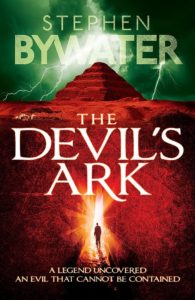
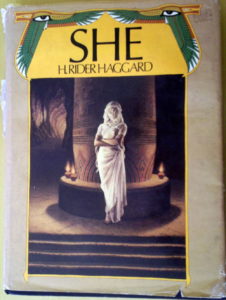
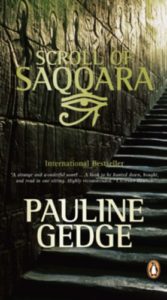
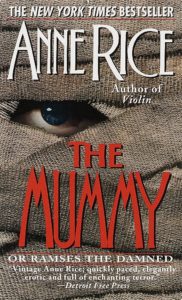
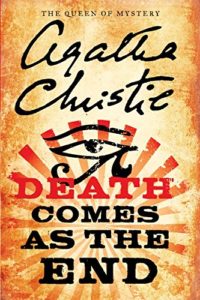
I’ve never seen the original, and it’s been forever since I saw the remake! Sounds like it’s time to rectify that!
The 1932 is a rare directorial outing for Freund, mainly known as a pioneering cinematographer— last time I rewatched it I opened his IMDb page and spent the next half-hour going “Wait, so this guy has Metropolis *and* I Love Lucy on his cv?
I also wonder if Jonathan in the 1999 movie, apart from the post-WWI characterization which I shouldn’t have need someone else to point out, exists partly because someone looked back at the 1932 Mummy and said “you know, that snarky grad student is just too good a character to be effectively killed off so early in the story.”